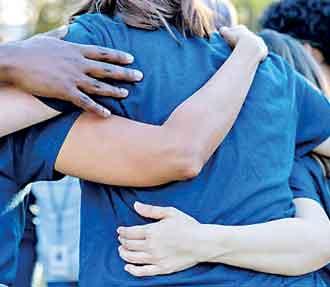15 Oct 2024 - {{hitsCtrl.values.hits}}

Let’s equip our youngsters with the tools to understand and manage their emotions. Let’s teach them that it’s okay to ask for help and that mental health is just as important as physical health.
 The recent deaths of school students have left an unimaginable void in their families, schools, and our broader community. These tragedies aren’t something we can sweep under the rug, nor can we allow ourselves to be paralysed by grief and shock. In the face of such a devastating loss, we need to ask ourselves—how do we come together to heal? And more importantly, how do we prevent something like this from happening again?
The recent deaths of school students have left an unimaginable void in their families, schools, and our broader community. These tragedies aren’t something we can sweep under the rug, nor can we allow ourselves to be paralysed by grief and shock. In the face of such a devastating loss, we need to ask ourselves—how do we come together to heal? And more importantly, how do we prevent something like this from happening again?
The truth is, our community is mourning. Students, teachers, parents, and friends are all grappling with overwhelming emotions: sadness, guilt, confusion, and anger. It’s a storm of feelings that can leave many feeling adrift. But we can’t leave anyone to weather this alone. As a community, we must step up, acknowledge the pain, and provide the support that’s so desperately needed.
We Must Talk About the Grief
 Too often, the aftermath of suicide is met with silence. The topic feels too heavy, too taboo. But silence does nothing but feed the stigma surrounding mental health. We need to start talking—openly and honestly. Grief can’t be pushed down or ignored; it needs to be expressed, shared, and heard.
Too often, the aftermath of suicide is met with silence. The topic feels too heavy, too taboo. But silence does nothing but feed the stigma surrounding mental health. We need to start talking—openly and honestly. Grief can’t be pushed down or ignored; it needs to be expressed, shared, and heard.
Schools have a vital role to play here. Students should be encouraged to talk about how they’re feeling. Whether that’s through open forums, group counseling, or simply safe spaces where students can express their emotions without fear of judgment, it’s crucial that we let our young people know it’s okay to grieve.
Immediate Support is Critical
In the wake of such a tragedy, immediate action is essential. Schools must ensure that mental health professionals are readily available—not just for a day, but for as long as it takes. Group counseling sessions, one-on-one meetings, and constant communication between counselors, students, and parents are vital to helping individuals process what has happened.
We also need to make resources accessible to those who may not be ready to talk yet. Brochures, online helplines, or even quiet spaces where students can go to find solace on their own terms—every bit of support counts.
Memorials can be powerful tools for healing, but they must be approached with care. Any tribute should focus on celebrating the life of the person while raising awareness about mental health. Let’s ensure that the takeaway is not just remembrance, but a call to action for those who are struggling in silence.
Let’s Rethink Memorials
When we lose someone to suicide, our natural inclination is to honour their memory. Memorials can be powerful tools for healing, but they must be approached with care. It’s crucial that we avoid glorifying or romanticising suicide. Instead, any tribute should focus on celebrating the life of the person while raising awareness about mental health. Let’s ensure that the takeaway is not just remembrance, but a call to action for those who are struggling in silence.
We Need to Keep the Conversation Going
 What happens after the initial shock fades? Do we move on, or do we continue the conversation? The answer is simple: we can’t afford to move on—not from the conversation about mental health. Long after the tragedy, students, teachers, and parents will still be grappling with their emotions. We need to ensure that counseling and support services remain available long-term, not just in the immediate aftermath.
What happens after the initial shock fades? Do we move on, or do we continue the conversation? The answer is simple: we can’t afford to move on—not from the conversation about mental health. Long after the tragedy, students, teachers, and parents will still be grappling with their emotions. We need to ensure that counseling and support services remain available long-term, not just in the immediate aftermath.
And we need to go further. Mental health education should be a staple in our schools. Let’s equip our youngsters with the tools to understand and manage their emotions. Let’s teach them that it’s okay to ask for help and that mental health is just as important as physical health.
The Power of a United Community
Finally, healing isn’t something that happens in isolation. We need to support each other—inside and outside of school walls. Families, too, need access to support services. Organising community support groups, offering family counseling, and connecting people with mental health professionals will create a web of care that no one can fall through.
But even beyond that, we need to foster a culture where it’s okay to check in on one another, where asking “How are you really doing?” isn’t just small talk. It’s time to break down the barriers that keep people from seeking help.
This isn’t just about responding to a tragedy. It’s about making sure that our response helps build a future where these tragedies don’t happen again. The road to healing is long, but by coming together as a compassionate, united community, we can make sure that no one has to walk that road alone. We can help each other heal, and we can make mental health a priority, not just a footnote.
Because in the end, that’s what we owe to those we’ve lost—and to those who are still here, struggling silently. We owe them a community that cares, that listens, and that acts.
|
If you or someone you know is struggling, please reach out for help. You can contact the following helplines: Sumithrayo: +94 11 269 6666 / 0112 682 535 / WhatsApp 0767 520 620 National Mental Health Helpline - 1926 CCCline: 1333 (available 365 days a year, 9:00 a.m. to 9:00 p.m.) Lanka Life Line: 1375 You don’t have to face this alone—help is available. |
04 Dec 2024 35 minute ago
04 Dec 2024 2 hours ago
04 Dec 2024 2 hours ago
04 Dec 2024 2 hours ago
04 Dec 2024 3 hours ago